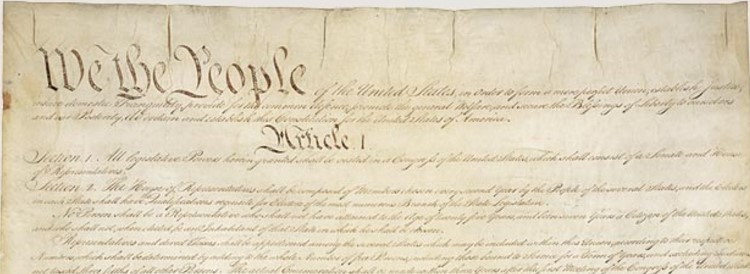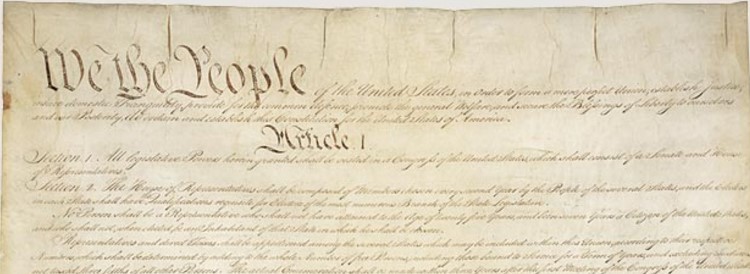Okay, everybody. Deep breath. We finished Article 1 of the US Constitution last week. Over the past few months, we’ve taken a look at the Preamble, our country’s mission statement. Then we moved on to Article 1, which deals with the Legislative branch of the US Government.
Section 2 is about the Executive branch, which is something we’re all giving some serious thought about these days. Here’s the thing that’s really important to remember: We have three branches of government. Each one is supposed to have checks and balances to keep the others from spiraling out of control. That’s why it was set up that way. We’re not at home to tyrants here in the US, but any branch of the government, unchecked, could be that tyrant.
Remember, guys, I’m a layman. I’m reading the text and interpreting what I think it means, but I am not a lawyer, nor am I formally educated as a Constitutional scholar.
So, lets jump in to the text.
The executive Power shall be vested in a President of the United States of America. He shall hold his Office during the Term of four Years, and, together with the Vice President, chosen for the same Term, be elected, as follows:
Each State shall appoint, in such Manner as the Legislature thereof may direct, a Number of Electors, equal to the whole Number of Senators and Representatives to which the State may be entitled in the Congress: but no Senator or Representative, or Person holding an Office of Trust or Profit under the United States, shall be appointed an Elector.
I wanna talk about the title we use for our Chief Executive for a minute. The term is “President” which is not as grandiose a title as you might think. It quite literally means, “one who presides.” Not rules. Not governs. Presides. That’s an important concept here.
So, how do we choose the person who will preside over the Executive Branch?
We do not elect the President directly. Our Chief Executive is chosen by the Electoral College. Each state has as many as they have Senators and Representatives in Congress. If you are an office holder in the US, you’re not allowed to serve on the Electoral College.
The Electors shall meet in their respective States, and vote by Ballot for two Persons, of whom one at least shall not be an Inhabitant of the same State with themselves. And they shall make a List of all the Persons voted for, and of the Number of Votes for each; which List they shall sign and certify, and transmit sealed to the Seat of the Government of the United States, directed to the President of the Senate. The President of the Senate shall, in the Presence of the Senate and House of Representatives, open all the Certificates, and the Votes shall then be counted.
The Person having the greatest Number of Votes shall be the President, if such Number be a Majority of the whole Number of Electors appointed; and if there be more than one who have such Majority, and have an equal Number of Votes, then the House of Representatives shall immediately chuse by Ballot one of them for President; and if no Person have a Majority, then from the five highest on the List the said House shall in like Manner chuse the President. But in chusing the President, the Votes shall be taken by States, the Representation from each State having one Vote; A quorum for this Purpose shall consist of a Member or Members from two thirds of the States, and a Majority of all the States shall be necessary to a Choice.
In every Case, after the Choice of the President, the Person having the greatest Number of Votes of the Electors shall be the Vice President. But if there should remain two or more who have equal Votes, the Senate shall chuse from them by Ballot the Vice President.
Remember when I talked about the fact that the US Constitution is meant to be a dynamic document? This is a great example. The Twelfth Amendment has modified the above passage. While I’d intended to leave Amendment discussions until later, we need to incorporate the 12th into our discussion here.
So what’s originally happening is that the person who gets the most votes will become the President, and the person who gets the next closest number of votes becomes the Vice-President. Notice also in the text, there is no presumption of a two party system. (In fact, our first President rather warned against establishing such a thing. The two party system is a matter of custom and practice, not the Constitution.
The Congress may determine the Time of chusing the Electors, and the Day on which they shall give their Votes; which Day shall be the same throughout the United States. No Person except a natural born Citizen, or a Citizen of the United States, at the time of the Adoption of this Constitution, shall be eligible to the Office of President; neither shall any person be eligible to that Office who shall not have attained to the Age of thirty five Years, and been fourteen Years a Resident within the United States.
Given the political issues of the past fifteen years or so, most of us have read this one. Congress is allowed to set a date and time to choose Electors.
And then:
To be eligible to be President, you have to be a natural born citizen, or a citizen of the US at the time of the adoption of the Constitution. (Yes, someone not born a citizen, but naturalized before 1787 was eligible – I throw this out there as an idea for people who might want to have a vampire or other immortal running for President. Could be interesting fiction…)
You also have to be thirty-five and have been living in the US for fourteen years.
In Case of the Removal of the President from Office, or of his Death, Resignation, or Inability to discharge the Powers and Duties of the said Office, the Same shall devolve on the Vice-President, and the Congress may by Law provide for the Case of Removal, Death, Resignation or Inability, both of the President and Vice President, declaring what Officer shall then act as President, and such Officer shall act accordingly, until the Disability be removed, or a President shall be elected.
This establishes Presidential succession in case of death or disability of the person in office.
This was modified in the late 1960s by the 25th Amendment, as history was teaching us that we desperately needed a much better and more detailed plan in case of emergencies. The 25th Amendment does this, which we will be dealing with much later on when we discuss the amendments.
The President shall, at stated Times, receive for his Services, a Compensation, which shall neither be increased nor diminished during the Period for which he shall have been elected, and he shall not receive within that Period any other Emolument from the United States, or any of them. Before he enter on the Execution of his Office, he shall take the following Oath or Affirmation: —”I do solemnly swear (or affirm) that I will faithfully execute the Office of President of the United States, and will to the best of my Ability, preserve, protect and defend the Constitution of the United States.”
The President will be paid for time in office. (Yes, the President can decline this payment, as has happened a couple of times). There are no raises or cuts for this compensation while in office. The President is also prohibited from receiving other perks or compensation while in office.
Before entering office, the President must either swear or affirm (swearing is considered a religious thing, and we were trying to allow for the fact that not all people have religions that allow for swearing – in fact, some people’s religious beliefs forbid swearing oaths) to fulfill the duties of President in full faith and defend the Constitution.


